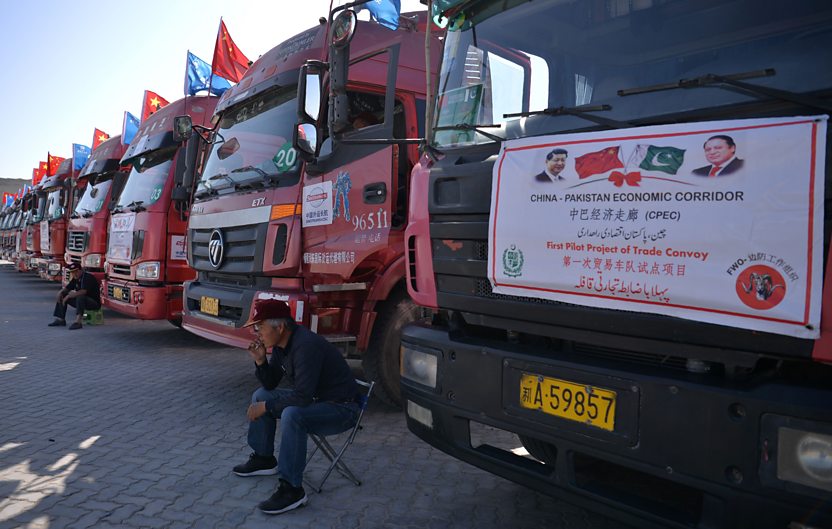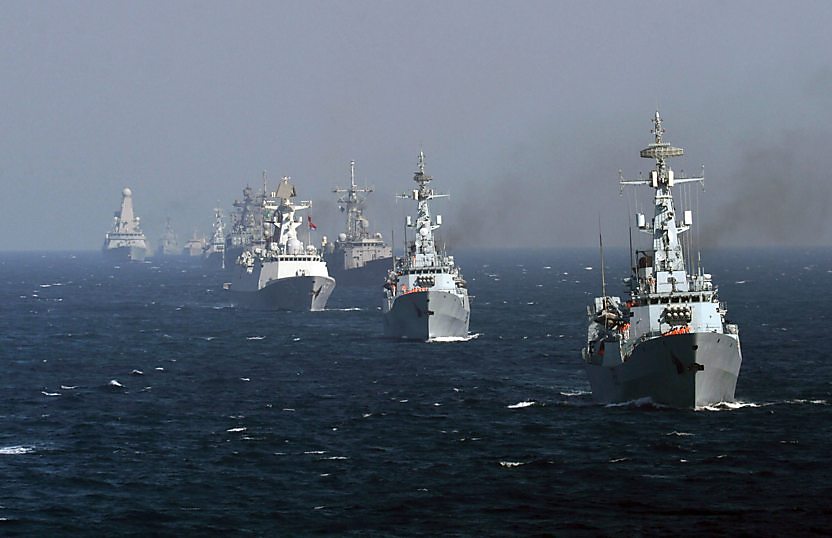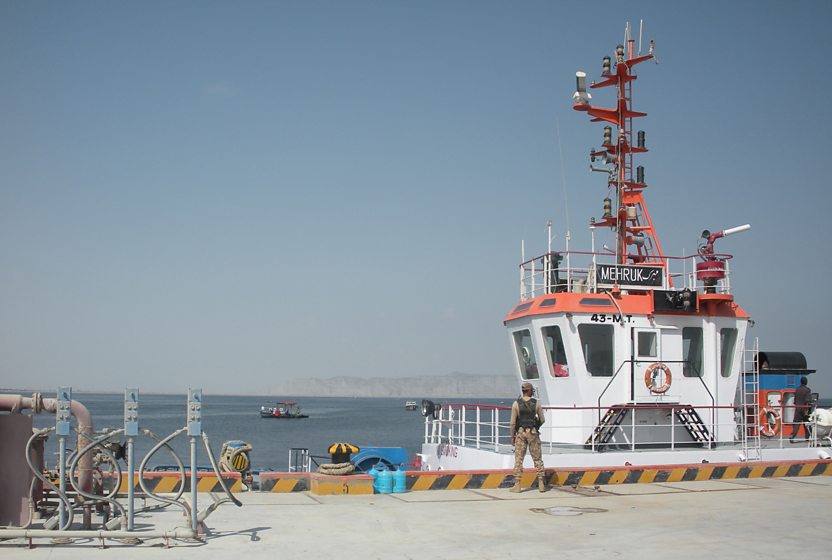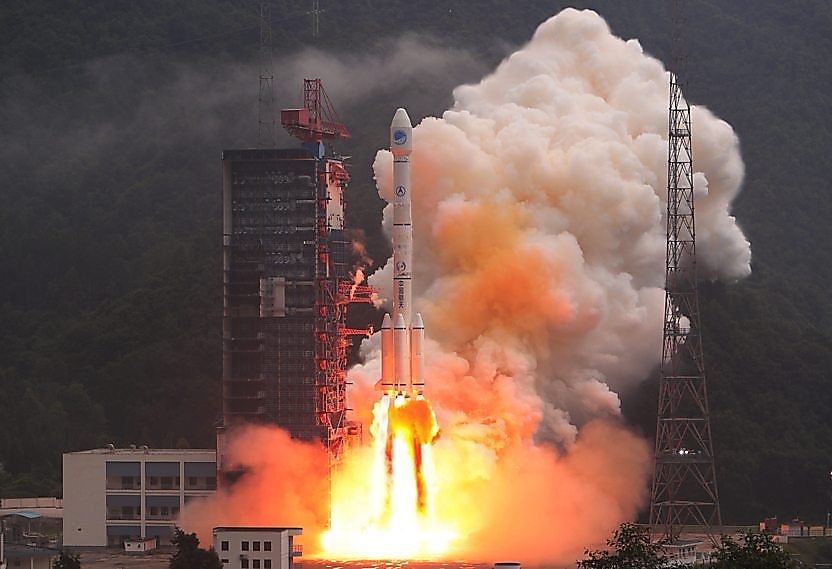By BBC Monitoring 10 March 2019

GETTY IMAGES CPEC comprises a group of infrastructure projects pegged at 62bn dollars
China’s much-discussed economic project in Pakistan, the China-Pakistan Economic Corridor (CPEC) – a part of Beijing’s ambitious trading network called the Belt and Road Initiative (BRI) – is believed to be taking a “military turn”, with speculation that military cooperation has been outlined as part of the project.
The speculation stems from a report by the New York Times published on 19 December 2018 that said the publication had reviewed a confidential plan to expand Pakistan’s building of Chinese military equipment, including advanced fighter jets.
Both Pakistan and China denied the report, saying the CPEC is a bilateral economic project and has no military dimensions.
However, there have been several developments indicating that China’s economic project in Pakistan may not be entirely devoid of military ambition.
Fulfilling global ambitions

GETTY IMAGES China, Pakistan carry out joint military exercises regularly
China-Pakistan relations appear to have been shifting from an “all-weather” strategic partnership to one where Beijing might be trying to integrate Pakistan into its own military efforts that are driven by global ambitions.
Military cooperation between the two countries currently covers many aspects. Pakistani military personnel are trained at Chinese institutions, besides carrying out joint military and counter-terrorism exercises.
Additionally, China has been actively selling military hardware to Pakistan, including nuclear weapons technology, warships, aircraft and missiles to Pakistan.
Pakistan’s prominent daily The Express Tribune said in a report on 18 October 2018 that Pakistan is the biggest importer of Chinese arms, accounting for 42 per cent of China’s total arms sales over 2000-14, citing a report by RAND Corporation – an American global policy think tank .
Zhang Youxia, a deputy chairman of China’s Central Military Commission which President Xi Jinping heads, has said that military ties between China and Pakistan are the “backbone” of relations between the two countries.
“The two militaries should further pay close attention to practical cooperation in all areas, keep raising the ability to deal with various security risks and challenges, and join hands to protect the common interests of both countries,” Zhang added.
Hailing Beijing’s building of an advanced warship for the Pakistan Navy, an editorial in Pakistani Urdu daily Nawa-e-Waqt on 4 January said: “Today, the presence of modern warships within a naval fleet is extremely vital to give a crushing response to the enemy.”
Military integration with Pakistan ‘logical’

GETTY IMAGES Pakistan’s Gwadar Port is one of the key CPEC projects
It appears to be quite “logical” if China’s BRI is taking a military dimension, and that the military integration is happening faster in countries like Pakistan that have bought more deeply into the economic side of the BRI, according to experts.
Matt Shrader, who is a China analyst at the Alliance for Securing Democracy – a trans-Atlantic security advocacy group – told BBC Monitoring: “The point of BRI is to integrate participating countries into a global network centred around China instead of the US. The Communist Party of China (the ruling party) wants to be the most powerful entity in the world, and they understand that power is military as well as economic.”
Referring to China’s military ambition in Pakistan, Shrader said: “It would actually be surprising if it this weren’t happening.”
There is circumstantial evidence to suggest that China is looking to establish a military foothold in the Indian Ocean.
Jeff M. Smith, who specialises in South Asia as a research fellow at Asian Studies Centre of the Heritage Foundation – an American conservative think tank – told BBC Monitoring: “Pakistan would seem to be the most logical destination for China to have a military installation. Why? Pakistan remains arguably China’s closest geopolitical ally. A military base near the port China built and operates at Gwadar in Pakistan would offer a valuable geographic toehold in the western Indian Ocean.”
‘Most advanced’ warships and Beidou navigation
China has begun constructing one of its advanced warships for export to Pakistan. One of China’s most advanced guided missile frigates, the vessel will be equipped with anti-ship, anti-submarine and air-defence capabilities, the Chinese media report.
The media reports go on to say that the ship will not just strengthen the Pakistan Navy’s capabilities but also help in maintaining the “balance of power” in the Indian Ocean region.
Pakistan is also among the first countries to hook on to China’s Beidou Satellite Navigation System, a rival to the US Global Positioning System (GPS), which went global recently.

GETTY IMAGES Pakistan’s reliance on US GPS ends with Beidou
Analysis: China’s global plans for its GPS ‘rival’ Beidou
The system, which can provide precise guidance for Pakistani missiles, ships and aircraft, is expected to be used for military applications.
Concern for India
Boosting military ties between Pakistan and China are likely to worry India, which has already been concerned over Beijing’s network of defence and commercial facilities in countries along the Indian Ocean.
India fears China’s so called military aid could be used in other South Asian countries such as Sri Lanka and Bangladesh, drawing them closer to China.
Smith said establishing a military base in Pakistan would surely generate friction in China-India ties, reviving Indian fears of encirclement via a “string of pearls” strategy.
Jayadeva Ranade, president of the Centre for China Analysis and Strategy in New Delhi, said in an article in Indian weekly The Sunday Guardian on 2 February: “China’s ambition of developing a kind of military force system has not changed. The steady development of China-Pakistan relations in India’s immediate neighbourhood provides ample evidence.”
Ranade in his article said that there are “clear indicators that China is not only strengthening Pakistan to restrict India’s growth by keeping it under direct military pressure, but that it plans to use Pakistan as the outpost for its extended global maritime reach.”
India’s respected English-language daily Hindustan Times in its 4 January editorial said that the recent “revelations” on China’s apparent military plans in Pakistan have “essentially unmasked China’s real goals behind CPEC and, more broadly, its Belt and Road Initiative”.
Similarly, leading English-language paper The Times of India said in its editorial on 22 December 2018 that India is the country whose security is most affected by China’s military plans in Pakistan.
Wider implications
Pakistan is one of China’s longest-established military partners, and apparently that trajectory hasn’t changed. What is new is that China has been increasingly advancing its capabilities, which it can offer and share with its allies.
Experts believe that BRI infrastructure schemes in member-countries such as Pakistan, Sri Lanka and Djibouti are all about giving access to China’s military.
Abhijit Singh, a senior fellow and head of maritime policy at the Observer Research Foundation think tank in New Delhi, told BBC Monitoring that with China’s Beidou Navigation Satellite System offering coverage over the entire South Asian region, there is a possibility that after Pakistan other regional states too could choose military integration with Beijing.
On 29 January, US National Intelligence Director Dan Coats, while speaking about the BRI’s military dimension in Pakistan, said: “You can look at the map and see a lot of strategic places where China has a real interest in perhaps a dual effort to not only provide infrastructure support; loan support for ports, airports, roads; a lot of infrastructure loans to help with their economy; but also interest in placing strategic military positions.”
China has been doing this across the globe, Coats added.
While commenting on China’s growing military capabilities, Coats said Beijing will use its military clout to “expand its footprint and complement its broadening political and economic influence” as it is doing with the BRI.
Source: BBC Monitoring 4 Mar 19
